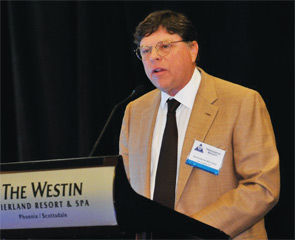SCOTTSDALE—The debate over soaring health care costs fails to properly acknowledge the benefits that have stemmed from improved medical technology and expanded medical knowledge, said Triological Society President Gerald Berke, MD, in an address at the society’s Combined Sections Meeting, held here on Jan. 27.
In otolaryngology, an area in which technological advances have figured so prominently, those benefits have been particularly striking, Dr. Berke said. “The most important factors contributing to the growth of spending for health care in recent decades have been the emergence, adoption and widespread diffusion of new medical technologies and services,” said Dr. Berke, chief of head and neck surgery at the University of California, Los Angeles. “Many of these innovations rely on costly new drugs, equipment and skills that have allowed us to diagnose and treat illnesses that were previously impossible. Although technological advances sometimes reduce costs, in medicine such advances and the resulting changes in clinical practice have generally increased spending.”
Rising Costs
Dr. Berke, who said the hardest thing about being the society’s president was trying to decide what to give his speech about, said that he was inspired by a dream he had recently in which he imagined a health care economics expert making an appearance at grand rounds in 1986. The expert, in the dream, warned that medical care consumed 12 percent of the national budget and that something dire would happen if that number didn’t come down.
Today, health care consumes 17 percent of the gross domestic product.
“I’m sure that same expert, if he were still alive, would be saying, ‘You can’t go any higher because something really bad is going to happen unless we make drastic changes,’” Dr. Berke said.
Over the last several years, the rate of increase in health spending has been the lowest in five decades, but the percentage of the gross domesstic product (GDP) going to health care has gone up because of an overall contraction of the GDP.
Apples and Oranges
His dreamed-about health care expert also went on about the neonatal death rate in the U.S. being as bad as a developing country and the overall quality of health care being 37th in the world.
Dr. Berke said comparisons like these ignore differences in how statistics are compiled from country to country. “Direct comparisons between countries may be misleading,” he said. In the U.S., he explained, all births, regardless of how far along the pregnancy is, are included in those numbers, while in other countries, only full-term births are included.

Leave a Reply